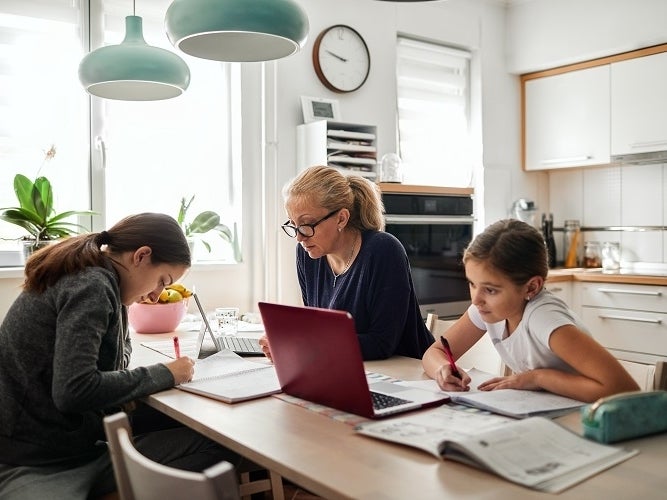
This post was contributed by a community member. The views expressed here are the author’s own.
Health & Fitness
Parents, guardians, children and school staff are figuring out how to adapt to this new form of schooling that COVID-19 has created.
By Edward-Elmhurst Health, Community Contributor

The changes people face from COVID-19 continue to create unanticipated challenges.
The introduction of e-learning in many schools has been one of those. Parents, guardians, children and school staff are figuring out how to adapt to this new form of schooling that COVID-19 has created.
Parents must balance work (and in many cases, working from home) with overseeing their children’s schoolwork at home. Teachers must figure out how to navigate this new form of online teaching and ensure that the quality of learning isn’t diminished.
While everyone does what they can to manage these changes, anxiety can still creep up. How can people most effectively manage e-learning?
First, make time for self-care. The term “self-care” is relatively new in pop culture. The definition is simple: self-care means taking care of yourself. However, it is not uncommon to be stuck on what exactly that means.
Self-care starts with the basics of making sure physical needs are met: eating regularly, sleeping well and taking care of daily needs (e.g., showering, brushing teeth, exercise). This is a good starting point when someone is struggling with managing the daily to-dos or the new challenges that COVID-19 may have thrown into the day.
So, when someone is having a particularly rough day with either getting the kids focused on their schoolwork or juggling your own work, they should take five minutes and check in with those small things. Ask:
- “Did I eat lunch?”
- “How has my sleep been?”
- “When can I take a shower next?”
Asking and answering these simple questions can help someone ground themselves for a moment to make sure they’ve met those basic needs.
The next step in self-care moves to emotional needs. Someone can do all the basic self-care items and still struggle to manage their anxiety over how to tackle the day. This is when people need to take time for themselves and do even small things that will help recharge their emotional batteries.
Taking time for self-care can be daunting, but it’s not impossible. Think of things that can make the day a little easier and see if it’s possible to make time for even one of those things each day.
When anxiety over e-learning feels overwhelming, try these emotional self-care techniques:
- Create an organized space for learning/working separate from where the “living/relaxing” occurs in the rest of the house.
- Take time to communicate with others about any support you need.
- Have an open conversation with your family about everyone’s frustrations with e-learning and brainstorm ideas for how to support one another.
- Start a text message chain with fellow parents or teachers with something you are grateful for once a day.
- End a discussion with small or big “wins” that you all feel have been accomplished or achieved for the day.
- Find kind words to post around the house or workspace that you find comforting, empowering or funny.
- Give yourself a reward for completing a day of e-learning that was especially challenging, such as ordering your favorite take-out meal or watching a movie you have been meaning to watch.
People can easily forget to do things for themselves, especially now. When someone engages in self-care, they are more attuned to not only what their body needs (basics of self-care) but also what they mentally need (emotional self-care).
For more information, visit .
The views expressed in this post are the author’s own. Want to post on Patch?
Loading…
![]()